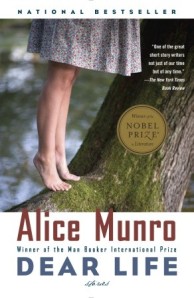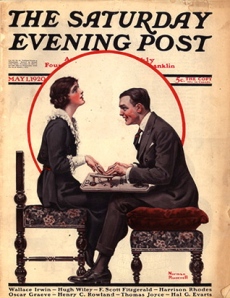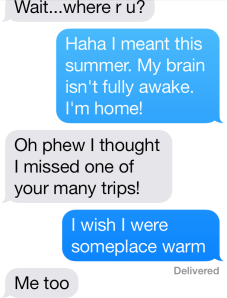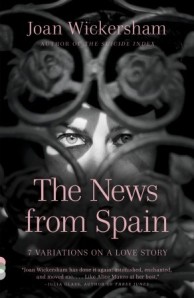Collections of short stories are hard to sell. I can almost predict the response when I offer a book of short stories to a customer:
ME: What can I help you find this afternoon?
CUSTOMER: Well . . . I’m just looking for something good to read. Anything you’ve read lately you would recommend?
 ME: Oh, yes! I really enjoyed Astray by Emma O’Donoghue. She wrote Room. It’s a collection of short stories, and I thought just about every story was wonderful.
ME: Oh, yes! I really enjoyed Astray by Emma O’Donoghue. She wrote Room. It’s a collection of short stories, and I thought just about every story was wonderful.
CUSTOMER: Uh-huh . . . I wasn’t really looking for short stories. Anything else?
And booksellers aren’t the only ones who have trouble convincing people to read short stories. Author David Abrams has the same problem, as he notes in the website Book Riot:
I’ve always been a champion of the short story, both as a writer and a reader, and it always stuns me into silence when I have friends–good friends, well-read, intelligent, reasonable friends–who dismiss short stories with a flap of the hand, a pinch of the lips, and a deprecating, “Oh, I don’t do short stories.” It’s said in the same tone of voice a vegetarian would say, “I don’t do meat.” When I come back with, “Why not?” the answers are always vague and insubstantial. I have yet to find anyone who can give me a solid, tangible reason they don’t like short stories. I suspect they’re afraid of short stories, an aversion that began in grade school . . . By their nature, short stories compress language to its densest gem-like state (second only to poetry); novels sprawl and emphasize plot and are generally more accessible to younger readers. I could be wrong, but I think the average 15-year-old would rather read The Catcher in the Rye than “Young Goodman Brown.”
 Writers themselves have a hard time selling their short stories. Most are grateful if their stories see print in obscure literary magazines. This wasn’t always the case. In the 1920s, F. Scott Fitzgerald was able to support a lavish lifestyle through sales of short stories to popular magazines; the Saturday Evening Post paid him as much as $4,000 for a single story. In 1930, Edith Wharton sold a story to Cosmopolitan for $5,000. (Imagine how much that would be in today’s dollars!) Writers used the income from short stories to support themselves as they worked on novels. Now, writes critic A.O. Scott in the New York Times, “A young writer who turns up at the office of an editor or literary agent with a volume of stories is all but guaranteed a chilly, pitying welcome. That kind of thing is just not commercial.”
Writers themselves have a hard time selling their short stories. Most are grateful if their stories see print in obscure literary magazines. This wasn’t always the case. In the 1920s, F. Scott Fitzgerald was able to support a lavish lifestyle through sales of short stories to popular magazines; the Saturday Evening Post paid him as much as $4,000 for a single story. In 1930, Edith Wharton sold a story to Cosmopolitan for $5,000. (Imagine how much that would be in today’s dollars!) Writers used the income from short stories to support themselves as they worked on novels. Now, writes critic A.O. Scott in the New York Times, “A young writer who turns up at the office of an editor or literary agent with a volume of stories is all but guaranteed a chilly, pitying welcome. That kind of thing is just not commercial.”
I’ve been reading that the short story is experiencing a resurgence. It’s true that Alice Munro, arguably the best short story writer of our time, won the Nobel Prize for literature in 2013, and that George Saunders was a 2013 National Book Award finalist for his short story collection, The Tenth of December. And digital publishing may be revitalizing the short story; in an article in the New York Times entitled “Good Fits for Today’s Little Screens: Short Stories”, Leslie Kaufman writes, “The Internet may be disrupting much of the book industry, but for short-story writers it has been a good thing.” She quotes Amber Dermont, a novelist who has recently published a short story collection: “The single-serving quality of a short narrative is the perfect art form for the digital age . . . Stories are models of concision, can be read in one sitting, and are infinitely downloadable and easily consumed on screens.”

In the same article, Cal Morgan, an editor at HarperCollins, says that digital communication has had a positive influence on younger writers:
The generation of writers out of college in the last few years has been raised to engage with words like no generation before. Our generation was raised on passive media like television and telephones; this generation has been engaged in writing to each other in text messages on a 24-hour basis. I think it has made them bolder and tighter.
Hmmm, I’m not sure if texting makes anyone’s writing “bolder and tighter”, and I really don’t think the new generation of writers has “been raised to engage with words like no generation before” — but I appreciate the attempt at putting a positive spin on round-the-clock texting.
Here’s my sales pitch for short stories:
- They’re . . . short. When you’re between books, or don’t have the time to immerse yourself in your current book, it’s very satisfying to read a thoughtful, well-written story. You feel like you’ve accomplished something. And there are many stories you can read in 10 or 15 minutes . . . stories that you will be thinking about for much, much longer than that.
- They’re usually very well-written. Writers who are able to publish collections of short stories are generally well-established literary writers. It takes a tremendous amount of skill to write a good short story. Even if you scratch your head trying to figure out what the story was really about, you will appreciate the writing.
- They’re perfect for book clubs. No one can show up to your book club without having read the selection — anyone can find the time to read a short story or two. How about a meeting where you compare two short stories? A discussion based on a story might actually last longer than a discussion of The Goldfinch — especially if only two members of your group have finished it and the rest don’t want the ending ruined.
- They are wonderful to listen to or to read aloud. I really enjoy the NPR Selected Shorts podcasts. I find it hard to listen to audiobooks; I keep losing track of the plot. But short stories are ideal for car trips or walks.
- They lend themselves to rereading. I’m much more likely to reread a short story than a novel. I’m often amazed by how much more I appreciate a story when I read it again. I’m sure I’d feel the same way if I reread I novel, but I rarely do that; there’s always another book waiting.
I recommend starting with a short story anthology so you can read what an editor considers the best stories by top short story writers. I love the Best American Short Stories series, which comes out in paperback every fall. Each year, there’s a different editor, who’s a well-respected author; the 2013 volume is edited by Elizabeth Strout. The O. Henry Prize Stories series is also wonderful. I can almost guarantee that if you pick up any book in either of these series, you will find at least one story that speaks to you.
 Here’s a list of 10 favorite short story collections, new and old:
Here’s a list of 10 favorite short story collections, new and old:
- What We Talk About When We Talk About Anne Frank by Nathan Englander
- Different Seasons (4 novellas) by Stephen King
- Bark by Lorrie Moore (due 2/25/14)
- Dear Life by Alice Munro
- The Complete Stories by Flannery O’Connor
- Nine Stories by J.D. Salinger
- Selected Stories by William Trevor
- Collected Stories and Other Writings by John Cheever
- Unaccustomed Earth and Interpreter of Maladies by Jhumpa Lahiri
Next on my list? The News from Spain by Joan Wickersham.
Further reading on short stories:
A Brief History of the Short Story in America (Critical Mass, blog of the National Book Critics Circle of America)
Sorry, the Short Story Boom is Bogus (Salon)
Brevity’s Pull: In Praise of the Short Story (New York Times)
Good Fit for Today’s Little Screens: Short Stories (New York Times)
20 for 2012: Short Story Collections (Book Riot)
Love this so much! As a short-story writer, reader, and a huge fan of Alice Munro, Jhumpa Lahiri, and Flannery O’Connor. I’m so glad Alice Munro won the Nobel Prize, and I’m very happy to have a list to pass to my short-story-skeptic friends!
I have always found it amazing how much has changed in the literary field. A short story use to be something of value now it’s a fluff piece. It’s so sad, too. I think the short story needs to be recognized as it’s own literary art form because that’s what it is. It takes a special kind of author who can masterfully piece together a believable story arch in just a few pages.
I love, love, love your post. I am a huge fan of the short story and I sometimes feel like a one-person army working in their defense. I was so happy when Alice Munro won the Nobel because I hoped that it would not only bring more people to her work but to the short story in general. I usually recommend starting with the prize anthologies here (Best American, O. Henry, and Pushcart).
I’m not generally a fan of short stories. I don’t really know why. I’ve been getting so many recs from this topic today, I might have to try some out.
Great post!
This is a fantastic post, thank you! I love short fiction, and I always have a hard time selling it, too. Most people go straight for the long fiction. I think it’s two things, really. First, a comfort thing – a “book” means a novel. And, second, people worry they won’t feel that sense of accomplishment or satisfaction from a short story (or short stories). But, as I always say, the shorter the fiction, the more important each word becomes.
Yes! So glad you commented on my post and led me to yours. You have so many great points and positives on the short story! I felt a resurgence in my reading this year to get back to them and find more great short story authors.